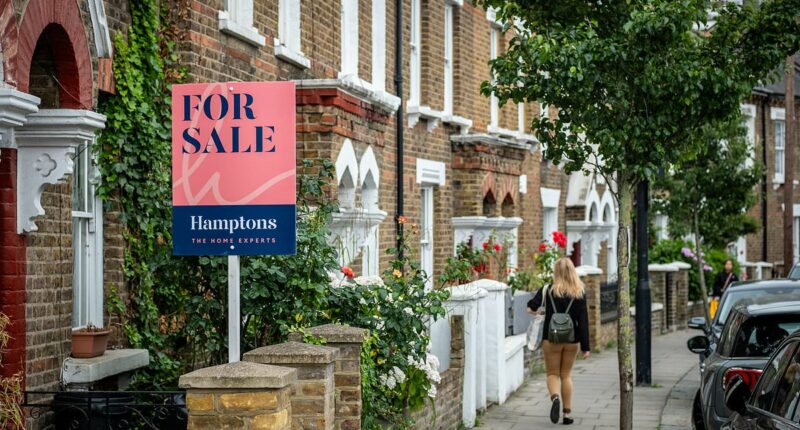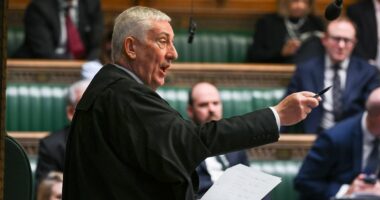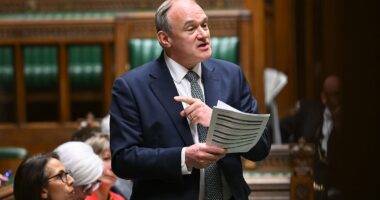Share this @internewscast.com
Rachel Reeves has been accused of seeking to hit middle-class homeowners with a ‘wealth tax in all but name’ under plans to shake up levies on property.
The Chancellor is said to have ordered Treasury officials to examine reforms to the current stamp duty system.
It comes as she seeks to boost economic growth and plug a black hole in the public finances – estimated by economists to be £50billion – in her upcoming Budget.
Under a radical plan said to be under consideration, owners of houses worth more than £500,000 could have to pay a ‘proportional property tax’ based on the value of their properties when they sell up.
It would replace the current system of stamp duty, which is paid by buyers rather than sellers and is widely seen as hampering the property market, according to The Guardian.
Over the longer term, a local property tax could also be introduced to replace council tax – with owners rather than residents paying levies based on the value of their homes.
Ms Reeves said of council tax in 2018: ‘We should also consider the case for its overhaul and replacement with a property tax, levied on property owners.’
Treasury officials are also said to be drawing on the findings of a report published last year by think-tank Onward, which proposed dual national and local property taxes that would both be paid annually.

Rachel Reeves has been accused of seeking to hit middle-class homeowners with a ‘wealth tax in all but name’ under plans to shake up levies on property

The Chancellor is said to have ordered Treasury officials to examine reforms to the current stamp duty system, which is paid by property buyers
Its author Tim Leunig wrote: ‘These proposals would make it easier and cheaper to move house, for a better job, or to be near family, as well as being fairer.
‘It shouldn’t be the case that a terrace house in Burnley pays more than a mansion in Kensington.’
The Guardian said that ministers have told officials to model the impact of the new system and report back to them, with a national tax capable of being implemented by the end of the decade.
But Elliot Keck, of the TaxPayers’ Alliance, warned: ‘If these reports are true then taxpayers are facing a wealth tax in all but name.
‘It is becoming abundantly clear that this avaricious Chancellor has an animosity for affluence which will cripple the country. Labour needs to dismiss these reports.’
Conservative leader Kemi Badenoch said: ‘Labour’s budget killed economic growth and has left Rachel Reeves facing a £50billion blackhole.
‘Her MPs won’t let her cut spending so now she’s inventing new taxes on your family home.
‘Only the Conservatives are committed to cutting the deficit, reducing spending and lower taxes.’

The Onward think-tank found replacing stamp duty with a national proportional property tax, levied on houses above £500,000, would ‘liberate houses in the £250,000-£500,000 market’

The think tank also recommended replacing council tax with a local proportional property tax, levied on house values up to £500,000 with a minimum annual payment of £800
Sir Mel Stride, the Tory shadow chancellor, said: ‘The Conservatives have warned that more taxes are coming and now reports are emerging that the family home is next in the firing line.
‘This tax grab would punish families for aspiring to own their own home.
‘Under Labour nothing is safe. Your home, your job, your pension – the Chancellor has all of it in her sights.
‘Rachel Reeves will tax your future to pay for her failure.’
The Onward report, published in August last year, backed an overhaul of property taxes after finding that stamp duty ‘deters people from moving and leads to an inefficient allocation of housing’.
It added that replacing stamp duty with a national proportional property tax, levied on houses valued above £500,000, would ‘liberate houses in the £250,000-£500,000 market’.
The think tank also recommended replacing council tax with a local proportional property tax, levied on house values up to £500,000 with a minimum annual payment of £800.
It said the rate would be set by local authorities, with a rate of 0.44 per cent raising the same amount of revenue as existing council tax.
The Chancellor has come under increasing pressure from within Labour circles to introduce a form of ‘wealth tax’.
Lord Kinnock – who led Labour between 1983 and 1992 – last month claimed a two per cent levy on assets worth more than £10million would raise up to £11billion a year and be popular with a ‘great majority of the general public’.
Meanwhile, in a memo that was leaked to The Telegraph in May, Deputy Prime Minister Angela Rayner had also suggested to the Chancellor that she increase taxes.
This included reinstating the pensions lifetime allowance and a higher corporation tax level for banks.
It was recently reported that Ms Reeves is looking at a fresh inheritance tax raid as she grapples with a black hole in the public finances.
Treasury officials are said to be examining whether to tighten rules around the gifting of assets and money.
The Tories warned the plans revealed Labour’s ‘politics of envy’, and said people should not be punished for passing on their hard-earned money.
A Treasury spokeman said: ‘As set out in the plan for change, the best way to strengthen public finances is by growing the economy – which is our focus.
‘Changes to tax and spend policy are not the only ways of doing this, as seen with our planning reforms, which are expected to grow the economy by £6.8billion and cut borrowing by £3.4billion.
‘We are committed to keeping taxes for working people as low as possible, which is why at last autumn’s Budget, we protected working people’s payslips and kept our promise not to raise the basic, higher or additional rates of income tax, employee national insurance, or VAT.’
















